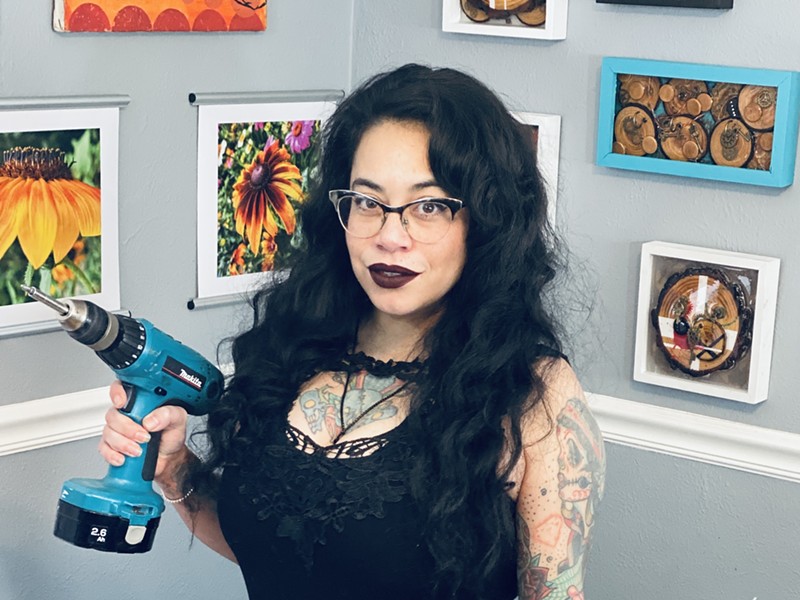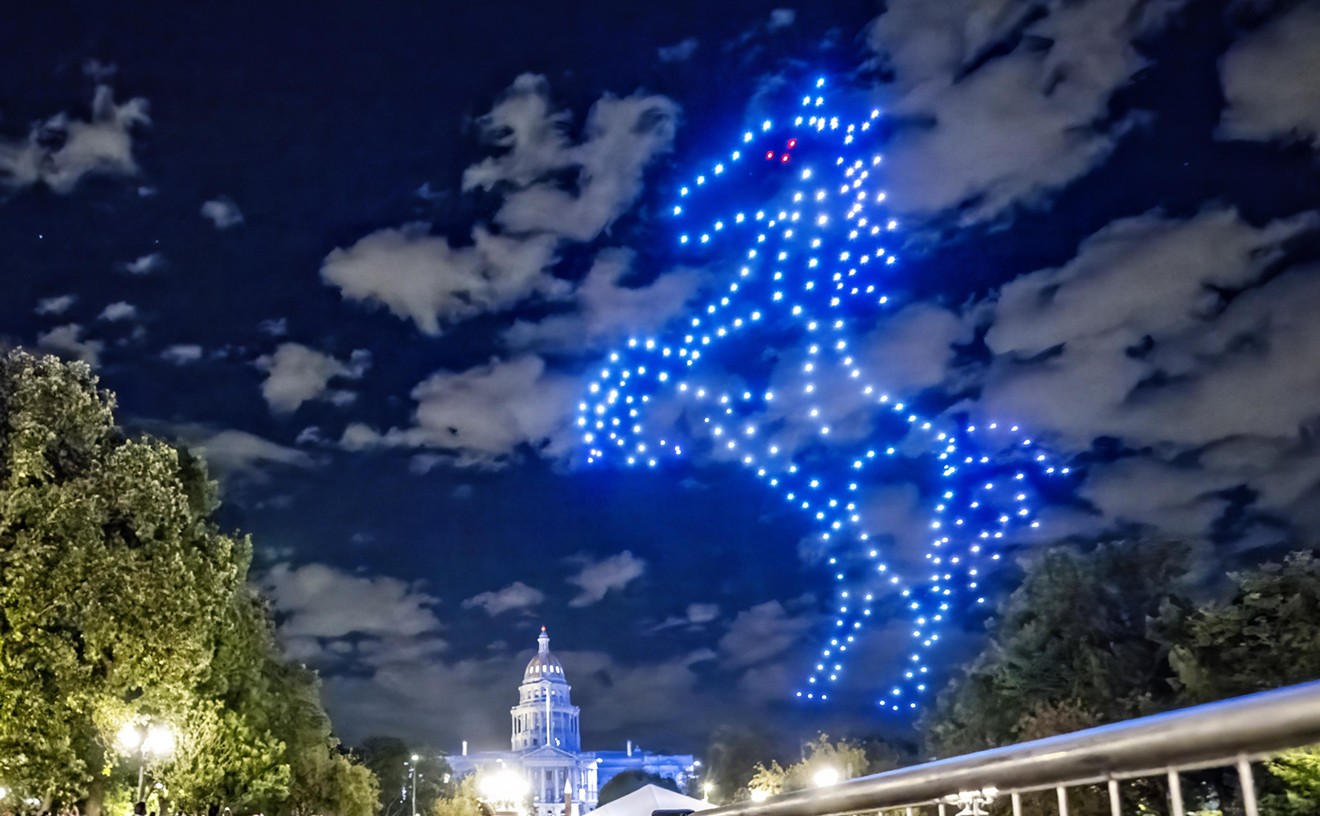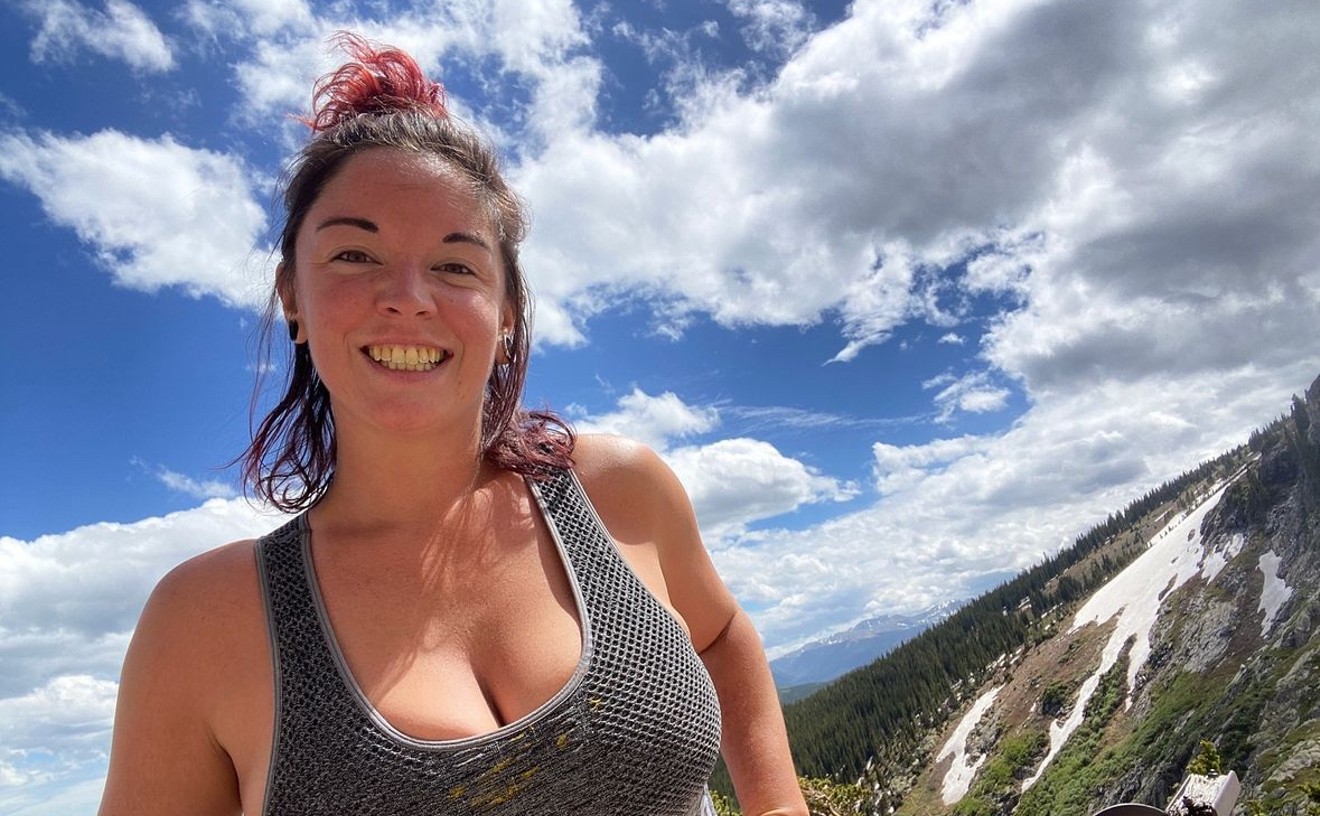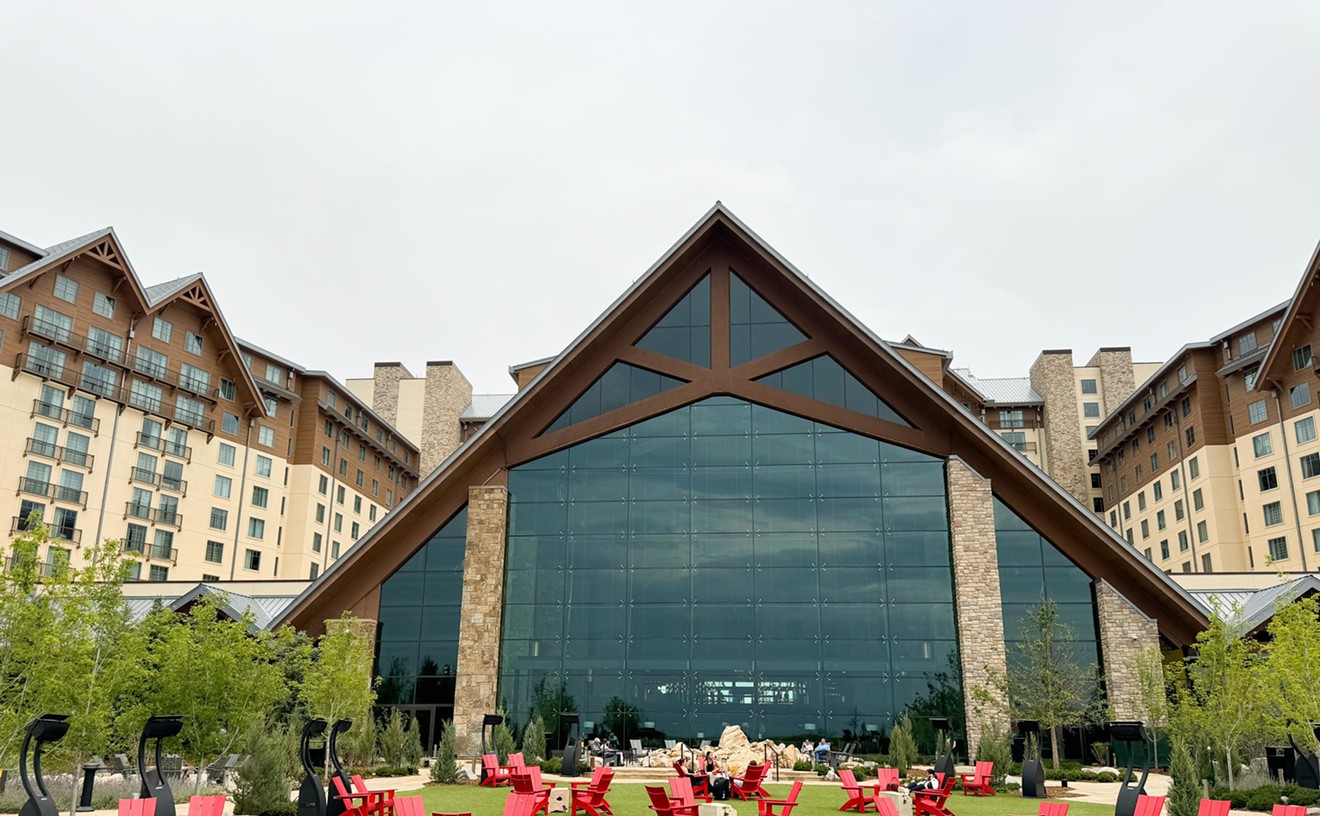Her parents divorced when she was a young kid. She split her time with her mother in Union City, New Jersey, during the school year and her father in Hialeah, Florida, over the summer.
“My mother and I moved around quite a bit when we were in Union City,” Zubizarreta says. “As a result, I went to a lot of different schools. I was bullied extensively for the majority of my childhood. [Visiting my father] was an escape from the bullying. To the kids in Hialeah, I was a big-city girl, and they assumed I was tougher than I really was.”
Zubizarreta, who has Aspberger's syndrome, found that the best way to avoid bullying was to enroll in various extracurricular activities and after-school programs.
“I partially believe it was better to be at cheerleading practice or at JROTC than to be on the streets of Union City or Hialeah in the early ’90s,” she says. “It was also because I didn’t feel like I fit in, and I would rather be doing something than [be] around more people who made me feel insignificant.”
Zubizarreta, who attended high school in Hialeah, had a knack for radio and got an internship with Radio Disney AM 990 Miami.
“I was known as Cheerful D,” she recalls. “It was one of the coolest things I’ve ever done, and I’m thankful that my high school gave me the opportunity to explore this. When I was a kid, I used to record songs off the radio on my boombox, and I would record myself over the DJs' bits, the weather, the news. Pretty much everything. I would give the tapes to my mom to listen to when she left for work.”
Zubizarreta also enrolled in her high school JROTC program and was interested in joining the military.
“I had a calling to [JROTC], and I enjoyed the structure,” Zubizarreta recalls. “It seemed obvious that I would join pretty early on. I accepted my invitation to Norwich University my senior year of high school and really saw a career that could last a lifetime.”
Zubizarreta attended the private military college after graduating in 2002. Because of injuries in both knees during training, she had to sit out and recover in physical therapy for a year. After recovering and then completing boot camp, she became master-at-arms and received vigorous training at Lackland Air Force Base in San Antonio. There she learned about policing, responding to domestic abuse and evasive driving, apprehending suspects and more. She officially joined the Navy in 2004 and was deployed to Guantánamo Bay.
While attending Lackland, she met her duty section leader, Cody. They hated each other in the beginning, but unexpectedly, they fell in love.
“He felt bad that we argued about a lot, and he asked me if I’d like to join him for dinner so we could get to know each other better,” Zubizarreta says. “We went to the restaurant and bar that was up the hill from our barracks.
“I had to leave early, because I was still new and had a muster time,” she continues. “I said goodbye and left. I got about halfway down the hill, and he screamed my name. The next thing I know, we were kissing, and I honestly thought I was in a fairy tale.”
Eventually they got married — but during their marriage, which lasted two years, they were both haunted by various inner demons. Their personal drama spilled into their work. As a result, Zubizarreta was honorably discharged from the Navy in 2006, and her husband died by suicide in early 2007. His death left her heartbroken and emotionally scarred at 22.
“This was by far the most excruciating experience I’ve ever had to endure in my life," Zubizarreta says. “I don’t think anyone is ever truly prepared for that kind of impactful loss at such a young age. Navigating it has been a roller coaster of emotions I wrestle with on a daily basis.”
To help cope with her losing her husband, she wrote a micro-play titled Cody. The script delved into their pain and opened discussions about veterans and active-duty soldiers' mental health issues and suicides. She sent it to Microtheater Miami in 2014, and the company performed the show.
Cody also appeared at Fort Lauderdale’s Fringe Festival in 2015. Zubizarreta donated the proceeds from the production to the Wounded Warrior Project, but also directly to unhoused people and disabled veterans.
“I was frustrated with programs like Wounded Warriors, because I wanted to help people directly if I could,” she says. “Miami has so many homeless veterans right in front of the VA hospital who could use a meal or help with co-pay. So many say that organizations like Wounded Warriors don’t really help as many people as they could, so I felt that starting in my community was essential.”
She continued to pursue her love of radio at Miami’s Live 305 FM and the Rogue Vixens Radio Network in the early 2010s. But her persona differed greatly from Cheerful D. She chose a new name and personality: The Vamp DeVille.
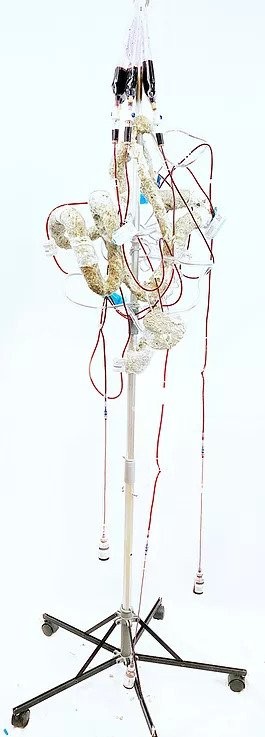
"Exposed" describes Zubizarreta's chronic illness with aluminum wire, tubing, fake blood, infusion supplies and Saran Wrap.
Denise Zubizarreta
“The name is actually a mix of a few things mixed together,” Zubizarreta explains. “Vamp was a nickname that came about because I’ve always been told I’m very light-skinned for a Hispanic woman, which made me feel like I had to own it and make it something better.
“The DeVille is my favorite car, and when I combined the two, it sounded more like me than 'Denise' did,” she continues. “I wanted to shed my Disney skin, and that was liberating and frightening. I think ['Vamp'] describes my artistic style. Also, it’s dark, twisty, raw — and that’s what Vamp is all about.”
She also made guest appearances on podcasts including Denver’s The Blatino Podcast and the short-lived The Graveyard Shift, which discussed Denver and Florida bands. She even co-hosted the now-deceased wrestling podcast Reality Check.
Through it all, she used her Vamp DeVille persona to address women's sexuality.
“Podcasting was new, and we were still navigating its norms and language,” she says. “This was also before we were openly using terms like ‘slut shaming.’ I was always very open to conversations about sex, sexuality and relationships. I also didn’t shy away from expressing myself with other women in ways that many would have deemed indecent...discussing a porn star’s career or reading off the messages we would get from men on a daily basis.
“I could be strong and sexy and curse and still be an intellectual and talented woman,” she says. “I was very annoyed with men, especially Hispanic men, telling me how I needed to live my life, and ultimately, what my life was going to be: I should be married, having kids and staying home, with no dreams for myself. I refused to accept that, and I lashed out with my voice, mind and body without apologies. It was liberating.”
Zubizarreta also dabbled in nude modeling, which had its ups and downs as well. She modeled for a tattoo magazine in Miami called Rogue Vixens, which also started a podcast focused on up-and-coming models and fans.
“I don’t think a lot of people really understand what’s behind the work, and they immediately label it as pornography,” she says. “I really enjoyed playing a character that didn’t necessarily represent me. It was more about what I wish I was when I wanted to be sexy.
“I can only speak for myself, but I would assume that many women face the same fear,” Zubizarreta continues. “'Is this hot? Am I sexy? Are they attracted to me? What is sexy?' I mean, the models we see in the world all look so perfect, and I was sick of not seeing women who looked like me: short, a little chubby, uneven features and flawed skin.”
Unfortunately, people started trolling her photos on social media.
“It became frightening when comments from strangers began to roll in,” she recalls. “‘You’re so fat. Why are you doing this?’ ‘You’re disgusting’ and ‘You should stop eating.’ There were even more comments about how I was a slut or a whore because I was in nude photos. That was when I realized the power of social media and how vicious it could be.”
Zubizarreta visited Denver in 2017 and loved it so much that she moved here in 2018.
“I was looking for a better health-care system and a community of artists that I could thrive in,” she says. “I’ve moved around a lot and have lived in over ten states, but I never really felt like I fit in anywhere. Once I visited Denver, I felt it in my bones that this was where I needed to be. I was on the search for metamorphosis.”
Despite the negative attention she once received on social media, she hopes to model again with Denver photographers. Her hope is that the climate for such work has improved.
“We were not having the same conversations back then about women’s bodies and our autonomy,” she says. “I hope that revisiting this with new eyes and understanding will be the exciting and wonderful experience I was searching for initially.”
Art was also something Zubizarreta had long been interested in, but it was hard for her to embrace it in Florida.
“For most of my adult life, I didn’t really know what I wanted to do,” she adds. “I’ve always been the ‘jack of all trades, but master of none.' I had my G.I. Bill, and it was about to expire. Denver reminded me of how amazing it felt to create, and I knew that I needed to be in a fine-art program.”
She enrolled in the Rocky Mountain College of Art + Design and even served as student-body president for two years. When the pandemic arrived, she started her own business selling prints, fashion accessories and home decor called The Vamp DeVille LLC.
“I really love pillows and interesting home decor pieces, but I don’t like the idea of buying it all from a chain and not knowing the artist behind it and its story,” Zubizarreta explains. “I also thought this would be a way for many to have access to affordable and local art. So many think of fine art and immediately pull away because they feel they can’t afford it. I wanted people to feel like they could own and love something without breaking the bank to do it.”
The pandemic has given her time to reflect on her life as well as build an in-home art studio with the help of her current partner, Matthew.
“I’ve lost some friends to the pandemic,” she says. “I’ve seen the person I was become a flicker in the background of my life. I’ve found love, and I’ve seen that family is what you make of it with the people who will ride with you no matter what. I have found that focusing on the positives outweighs all the other thoughts, and for that, I am grateful.”
Zubizarreta enjoys photography and making sculptures and digital collages.
“I don’t mind getting my hands dirty — crawling on the ground to get the perfect shot, or even randomly exploring to find something visually stimulating," she says. "I want to feel my art, and I want it to feel me. I want people to be in front of my sculptures and feel the energy from my palms radiating off the piece. But I also love the distance I can create from the work with digital collage and motion graphics.”
Her work tackles various aspects of her life from her childhood and past relationships to chronic illness and Black Lives Matter. One of her pieces, "Exposed," will be on display at Lakewood's Edge gallery in May. It's a paper and clay sculpture that showcases infusion supplies, tubing, aluminum wire, fake blood and Saran Wrap to display her mortality and anxieties.
“All I had was my experience and how it made me feel,” she says. “I made a pretty immediate choice to simultaneously unpack my pain in therapy and through my work. The medical pieces like "Exposed" are very physical, and the pain necessitates the medium. I needed to touch my invisible illness and experience it in a physical manifestation.
Another notable piece is "How Will You Take It?," which Zubizarreta describes as a drinkware collection of hand-carved shot and shooter-sized tree stumps. This drinkware is a symbol of the discussions she’s had with others on how to do her part for the Black community in the wake of high-profile police shootings.
“I remember being told by someone, ‘Why don’t you plant a tree for Black Lives Matter?’ and being massively offended,” she reminisces. “Plant a tree? With there being such awful connections between the Black community and lynchings, it seemed to me to be obvious that not only was that just virtue signaling, it was extremely offensive and disgusting to even suggest that planting a tree would change anything for the Black community amidst the unpacking of police brutality.
“So I chopped them down,” Zubizarreta continues. “I wanted to force the viewer to ingest the horrific-ness of it all from the trees that were forced to bear bitter hatred. How will you take it, shot after shot, shooter after shooter?”
Zubizarreta has displayed her work at various Colorado galleries including the Rocky Mountain College of Art + Design, Emmanuel Gallery, Redline Contemporary, and even the Las Laguna Art Gallery in Laguna Beach, California, in 2020.
“I find myself overwhelmed by social interaction and large crowds, so [the pandemic] was a perfect way for me to share my work without feeling anxiety about how I was coming across conversationally,” she says. “Also, I feel the need to tell people about my Asperger’s so they can understand me more.
“I know I’m different, but I don’t want to be treated differently,” she continues. “I don’t want to be treated like there is something wrong with me. Being different doesn’t mean that I have to be treated like a fragile Fabergé egg.”
In addition to art, Zubizarreta keeps herself busy by speaking to high school art clubs, working on academic papers, recollecting her life in a memoir with a 2022 release date and more. She was recently asked by RMCAD to discuss effective learning for students on the autism spectrum. But the main reason she stays busy is to reach the goals she set for herself years ago.
“I decided I was going to find my passions in life and pursue them,” she explains. “I was going to go back to school, and I was going to believe in myself. My goal was to find my power in the following five years. I push because I feel like I owe it to [Cody] to keep moving forward. Like, I have to see the world because he can’t. Though I wish I could’ve taken his pain away, I can’t and could not. But I can help others to seek out treatment; to speak up for mental health care in the military and as veterans; to speak up against domestic abuse. I have to be something so the world will take these topics I’m discussing seriously so we can make change.
“I have this feeling inside me, like I’m right at the precipice of something great, and I tend to put all my energy behind those feelings when they come up,” Zubizarreta continues. “When I say [I'm] ‘all in,’ I mean every ounce of me and nothing less.”
As Zubizarreta takes on more projects and completes more art, she wants those who see her work to fully interact with it and feel a connection to her as an individual.
“I want the viewer to depart from fear, from the questions of meaning,” she says. “I want them to engage with me in one specific moment. In a sense, it’s similar to time travel, digesting my work. I created it in the past, but it can become the future, present or past at any moment for the viewer. The visual unites us both with a memory. Mine triggering theirs, and for a brief moment in time, we are the same.
“I think the biggest takeaway from it all would be that you never really know what someone else is experiencing,” Zubizarreta concludes. “Even the most painful things can be hidden beneath a beautiful shell.”
To learn more about Denise “The Vamp DeVille” Zubizarreta and her work, visit her website. You may also see her work at Core New Art Space, 6851 West Colfax Avenue in Lakewood, April 16 through May 2. For more information, go to Eventbrite.
If you're thinking about self-harm, call the National Suicide Hotline: 1-800-273-8255.

